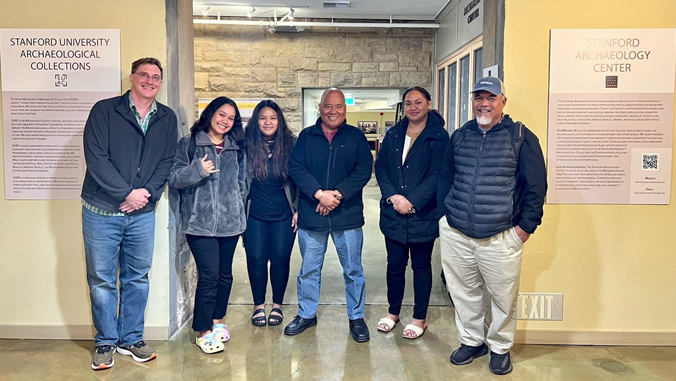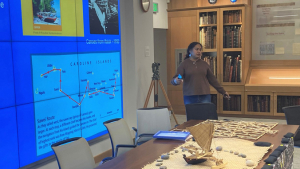
Three students from the University of Hawaiʻi at Hilo showcased their research on Marshallese and Yapese voyaging using oral histories of the centuries-old tradition at a four-day workshop at Stanford University. The event held at Stanford’s Archaeology Center December 7–10 brought together students, archaeologists, cultural anthropologists, environmental scientists and maritime practitioners to deep dive into modeling ancient seafaring from across the globe and computational archaeology, which uses computer-based analytical methods for the study of long-term human behavior and behavioral evolution.
“The workshop was absolutely incredible especially in terms of the impact on the students,” said Joseph Genz, an associate professor of anthropology at UH Hilo who accompanied the students.
The workshop was a sequel to a two-year project that launched last fall. In 2021, UH Hilo graduate students Shania Tamagyongfal and Jerolynn Myazoe, who are in the heritage management program, and undergraduate Tromainne Joab, an environmental studies student, teamed up with a group of anthropologists, environmental scientists and a UH Hilo philosopher to conduct research for an e-book on Pacific voyaging and navigation. The students are now in their second year on the e-book project.
Navigation practitioners Alson Kelen from the Marshall Islands and Larry Raigetal from Yap have been mentoring the UH Hilo students for the past three semesters. Kelen and Raigetal also presented at the Stanford workshop and focused on the role of canoe-building and navigation in Yapese and Marshallese seafaring systems.
Turning to tradition in modern times

Graduate students Tamagyongfal and Myazoe’s theses projects provide findings based on oral histories of Marshallese and Yapese voyaging to support the development of community engagement for sustainable sea transport. The U.S. Geological Survey’s Pacific Islands Climate Adaptation Science Center (PI-CASC) is supporting their graduate work. Both students are part of a cohort of PI-CASC graduate scholars from UH Hilo, UH Mānoa and the University of Guam.
Learn more about their project
“The possibility of diving into the remote past to model ancestral voyaging networks in response to environmental catastrophes and using that knowledge for community-based climate change adaptation strategies fueled so much dialogue, energized the students, and has opened new opportunities and potential collaborations,” Genz said.
According to Genz, the workshop experience helps students make deeper connections to their research and engagement in the voyaging e-book project as part of their participation in the Keaholoa STEM Scholars Program, an academic program at UH Hilo that aims to increase underrepresented minorities, especially Native Hawaiians and other Pacific Islanders, in science, technology, engineering and mathematics through various programs.
For the full story go to UH Hilo Stories.

